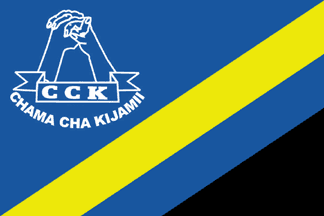 image by Jens Pattke, 12 Jan 2014
image by Jens Pattke, 12 Jan 2014Chama Cha Kijamii (Social Reform Party) is a small opposition political party in Tanzania.
Jens Pattke, 12 Jan 2014

FOTW beschäftigt sich mit der Wissenschaft der Vexillologie (Flaggenkunde).
Alle auf dieser Website dargebotenen Abbildungen dienen ausschließlich der Informationsvermittlung im Sinne der Flaggenkunde.
Wir distanziert uns ausdrücklich von allen hierauf dargestellten Symbolen verfassungsfeindlicher Organisationen.
Last modified: 2014-02-22 by bruce berry
Keywords: tanzania | tanu | afro-shirazi | hoe | masai |
Links: FOTW homepage |
search |
disclaimer and copyright |
write us |
mirrors
![[Afro-Shirazi party]](../images/t/tz}asp.gif) image
by Ivan Sache, 06 Aug 1999
image
by Ivan Sache, 06 Aug 1999
The Afro-Shirazi party has a flag of blue over black over green with
a yellow hoe in the centre. It influenced the 1964
flag of Zanzibar.
Stuart Notholt, 1996 Jun 29
Smith [smi75b] says that these are
real flags and not only party emblems, which may differ in colours when
used as emblem or in a flag.
Ivan Sache, 06 Aug 1999
 image by Jens Pattke, 12 Jan 2014
image by Jens Pattke, 12 Jan 2014
Chama Cha Kijamii (Social Reform Party) is a small opposition political
party in Tanzania.
Jens Pattke, 12 Jan 2014
![[Chama Cha Mapinduzi]](../images/t/tz}ccm.gif) image
by Martin Grieve, 05 Apr 2004
image
by Martin Grieve, 05 Apr 2004
I recently visited Tanzania and saw many flags of the ruling Chama Cha Mapinduzi (CCM) party in evidence. These were mostly home-made flags flying on small poles on street corners, in market stalls and near pavement kiosks. The flag of CCM has a plain green field with the emblem of the party, a crossed hammer and hoe, in yellow in the canton.
Chama Cha Mapinduzi (The Revolutionary Party of Tanzania) was formed in 1977 following the merger of the Tanganyika African National Union (TANU) and the Afro-Shirzai Party of Zanzibar. TANU was formed in 1954 with Julius Nyerere as its leader. The party won the country's first general election, following which Nyerere was asked to form the first government when Tanganyika obtained independence from Britain in 1961. Zanzibar achieved independence in 1963 as a separate and sovereign country, under the al-Busaidy Sultan.
Tanganyika became a republic in December 1962, one year after achieving independence, and the direct presidential election brought TANU's leader, Julius Nyerere, to the presidency. In 1965 the Constitution was changed to establish a one-party system. Meanwhile, in Zanzibar, a revolution had overthrown the Arab Sultan in 12 January 1964, one month after independence and the Constitution was abrogated. Abedi Amani Karume was declared the first African President of the Peoples' Republic of Zanzibar and the country became a one-party state under the Afro-Shirazi Party. On 26 April 1964, Tanganyika and Zanzibar united as the United Republic of Tanzania with Julius Nyerere as President and the head of state with Karume as his Vice President, who also retained at the same time the Presidency of Zanzibar.
In 1977, the two ruling parties, TANU and the Afro Shirazi Party, merged
to form the Chama Cha Mapinduzi (CCM). In 1985 Nyerere stepped down voluntarily
as Head of State and Ali Hassan Mwinyi succeeded him as Head of State.
Constitutional changes allowing the return of a multi-party system were
introduced in 1992. The CCM won the presidential and parliamentary elections
held in 1995. Mwinyi stepped down in 1995, having completed the constitutionally-mandated
maximum of two terms in office and Benjamin William Mkapa of CCM was elected
as Head of State of Tanzania.
Bruce Berry, 05 Apr 2004
![[Chama Cha Mapinduzi variant]](../images/t/tz}ccmv.gif) image
by Jaume Ollé, 03 Apr 2004
image
by Jaume Ollé, 03 Apr 2004
CCM won the elections in 2000, but opposition reported irregularities.
The independent feelings are growing in Zanzibar and Pemba.
Jaume Ollé, 03 Apr 2004
![[Civic United Front]](../images/t/tz}cuf.gif) image
by Jaume Ollé, 03 Apr 2004
image
by Jaume Ollé, 03 Apr 2004
The opposition is CUF, Civic United Front or Chama Cha Wananchi, has
its main base in Pemba. It stands the independence of
Zanzibar and Pemba and
is predominantly Muslim.
The exact status of Pemba is unknown to me. Perhaps has some kind of
autonomy within Zanzibar. A Pemba Peoples Republic was proclaimed 18 January
1964 with a red flag with green map of the island in the centre.
Jaume Ollé, 03 Apr 2004
![[Masai flag]](../images/t/tz}masai.gif) image
by Dirk Schönberger, 31 Mar 2001
image
by Dirk Schönberger, 31 Mar 2001
"Nations Without States" (James Minahan, 1996) describes a flag
purportedly of the Masai national movement. It is red with a black and
white Masai shield in the center, and white, crossed spears behind the
shield.
I have a scan of the line drawing showing this flag.
Ned Smith, 19 Mar 2001
![[Masai flag]](../images/t/tz_masai.jpg) from this
website.
from this
website.
I don't know whether you have ever discussed the existence of a "Maasai
nation's flag" such as the one hardly described here.
It says little about it, but enough to know that this cannot be the
Masai movement flag described above.
Thanh-Tâm Leh, 24 Aug 2004
![[Flag of Tanganyika African National Union]](../images/t/tz}tanu.gif) image
by Ivan Sache, 03 Oct 2001
image
by Ivan Sache, 03 Oct 2001
The political flag of the ruling political party of
the then Tanganyika (Tanganyika African National Union) consisted of three
horizontal stripes of Green-Black-Green. Since 1964, There have been no plans to alter the National Flag
Mohamed Juma, 2 Oct 2001
This is in full agreement with Smith (1975) [smi75a] and DK Pocket Book
(1997) [udk97].
Ivan Sache, 03 Oct 2001
Hosted by: Fanshop-Online.de und Handy-Shop.de
Tipp: Apple iPhone 12 im Shop